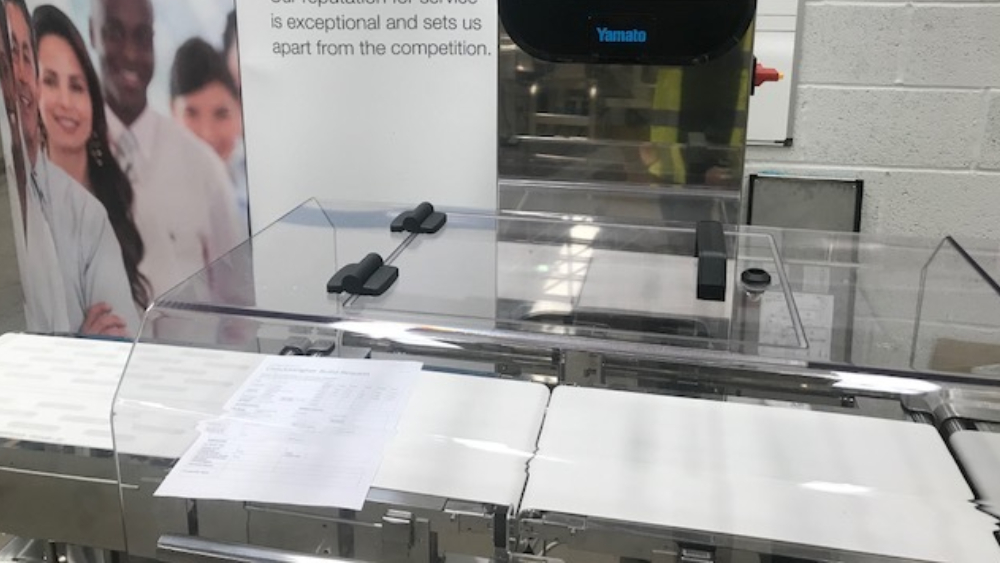How do I keep my checkweigher operating smoothly?

A checkweigher is an integral part of your production line. So, it is critical to keep it operating smoothly to minimise disruption.
As with any machine you may have in your plant, your checkweighing systems are subject to wear and tear as a result of daily use. If left untended, this could result in damage and ultimately lead to a production line being out of action. It may also lead to inaccurate readings, undetected contamination, inconsistent portion and quality control and overall disruption to your productivity. This will cost you time and money and may even damage your reputation as a trusted supplier.
Due to the potential consequences of a broken checkweigher, you should do everything to address any issues before they progress. This will enable you to reduce waste and downtime and ensure a better return on investment from having longer-lasting, efficient systems.
Find out the steps you should take to keep your checkweigher in good working order and maximise results.
Review as part of an equipment maintenance plan
There is never a good time for breakage to occur in your production line, particularly as most happen unexpectedly. However, catching the signs of damage at the earliest stage possible enables you to take a proactive approach to repairs, limiting the impact and reducing hours lost.
With this in mind, it is best to systematically and regularly review your checkweigher for any indicators of fault. This could include searching for loose or broken parts in the system or running tests to ensure it is operating accurately and correctly.
This is where an equipment maintenance plan (EMP) proves useful. An EMP is a documented schedule of how you will undertake maintenance in your plant, including how often. It should cover all the machinery in your factory – including your checkweigher.

The main advantage of an EMP is that it offers a methodical and structured approach to reviewing your site equipment, ensuring that it is frequently checked and giving you the opportunity to address any errors ahead of time. By doing so, you may minimise and even avoid any unfavourable consequences to your operations and products. The frequency in which you review your checkweigher and other equipment should be aligned to how heavily they are used in your production.
Alongside your EMP, you should ensure open communication with your machine operatives and encourage them to report any issues they see promptly. As these employees are likely the ones working with your checkweighers daily, they are best positioned to notice any discrepancies that could indicate machine damage. So, ensure there are appropriate training and processes in place to allow them to raise any concerns and conduct thorough checks when any issue is reported.
Ensure proper use
While every checkweigher is susceptible to standard wear and tear, leading to the eventual need for repair, there are some avoidable factors that can speed up the process. These include user error, a poor working environment, incorrect loading, incompatible substances being used on the machine and so on. Improper use such as this will heighten the strain on your systems over time, and may even lead to immediate damage.
Taking preventative action to reduce the pressure on your checkweighers is recommended to increase their lifespan and spread out the need for repairs. This means you get more value for your money and saves you unnecessary effort. So, it makes sense to ensure your systems are being used correctly and safely at all times.
The first step to ensuring the right usage of your checkweigher is to check its compatibility with your production line. The needs of your plant will dictate the systems you use – and any checkweigher you install must be useable for the applications you intend to run through it. For example, wet substances are suited to waterproof checkweighers, while durable and robust systems should be used for solid substances, like hardware. It is therefore vital to ensure you’ve selected the appropriate checkweigher for the product/s you are looking to process.

Next, you will need to install your checkweigher correctly, in a suitable environment. Outside factors like temperature, proximity to other equipment and uneven flooring can affect the precision of your machine, as well as making them more prone to developing faults. Similarly, incorrect installation or calibration of your checkweigher may lead to problems with how it functions and result in damage over time. If you are unsure of how your system should be installed, or what conditions it will do best in, it is recommended to consult the manufacturer. Many manufacturers will install the system for you or provided tailored instructions.
Finally, you must provide suitable training to any operatives working with the checkweigher. This should cover off aspects like how to load the system, how to operate it and how to stop it when damage prevention is needed. By adequately training the relevant employees, you will empower them to use the machine to maximum effectiveness and efficiency, which will drastically reduce the risk of damage via user error. It will also enhance your results and boost staff safety.
Replace parts as required
Ensuring efficient use of your checkweigher and undertaking regular maintenance will enable you to reduce wear and tear and spot risks ahead of time. However, when you do identify a fault in your system, it is necessary to take swift action to resolve it. Often, this means carrying out repairs and replacing worn or broken parts.
Despite the up-front cost, the replacement of parts will be cheaper in the long run as it allows manufacturers to fully address the issues and extend the life of their systems. It is also a cost-effective solution when compared to replacing the entire machine – mainly because reputable suppliers maintain a stock of genuine spare parts and will be able to come and fit them for you – allowing for a far speedier turnaround.

A checkweigher comprises numerable components, each of which play a role in its function. When one part is broken, it may cause the system to operate ineffectively or stop altogether. It is therefore essential to review the operating of the checkweigher and replace components as needed.
The belt is one of the most vital components in your checkweigher, as well as one of the most commonly replaced. There are typically up to three belts in a checkweigher as part of the chain belt system. This includes:
- Infeed belt – controlling the speed and product flow of substances, and ensuring appropriate spacing between batches
- The weigh belt – used to detect the weight of an item through the load cell
- The reject belt – separates non-compliant items from the production line
If any one of these belts were to break, production would stop.
Due to this, it is vital to have a healthy stock of spare parts in your warehouse that enable rapid repairs to your systems. This could include belts or any of the other components within your checkweigher. By ordering these parts in advance and storing them for the moment they are required, you can save time instead of having to wait for the delivery of parts. This will allow you to minimise downtime and losses to your business.
Summary
An ideal production line is one that operates efficiently, every day. This means ensuring that every piece of machinery is in good health and ready to fulfil its role – especially when that system is a significant part of your production, like a checkweigher is in many plants.
Taking an approach of compliant use, regular maintenance and prompt repair, as well as the replacement of faulty parts as necessary, should enable you to keep your checkweigher running smoothly for the long-term. As a result, you will boost your return on investment and reduce the need for avoidable expenditure on buying-in new systems.
At Yamato, we aim to support you in getting optimal value from your checkweighers. We offer several services, such as installation, staff training and maintenance contracts, which can help you to keep your production line in working order and processing your products with the desired outcomes.
We also offer a range of spare parts, including checkweigher belts, despatched from our warehouses to help you build an inventory of parts for swift repairs. All of our parts are genuine, ensuring easy replacement and long-lasting quality, and backed by a 12-month guarantee.

